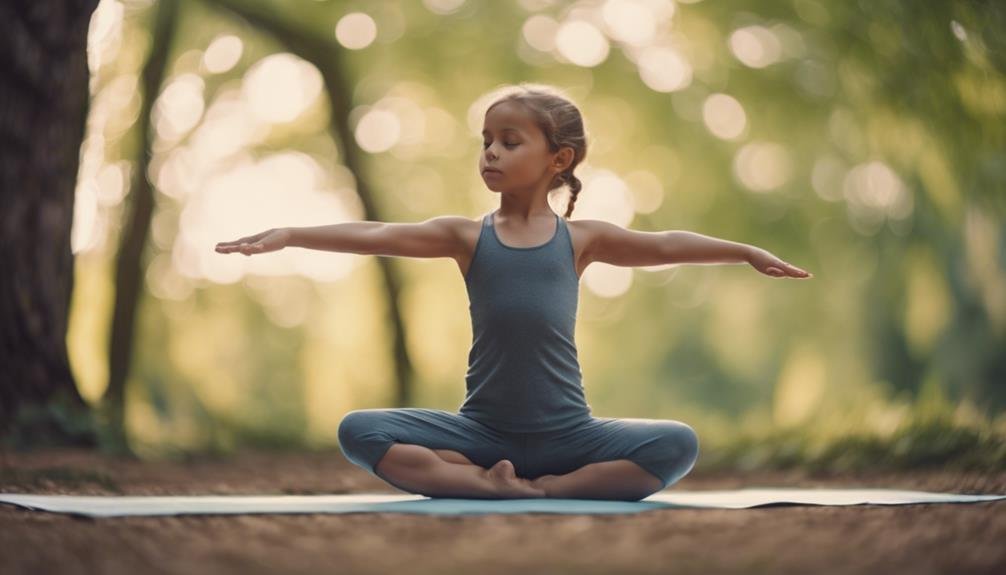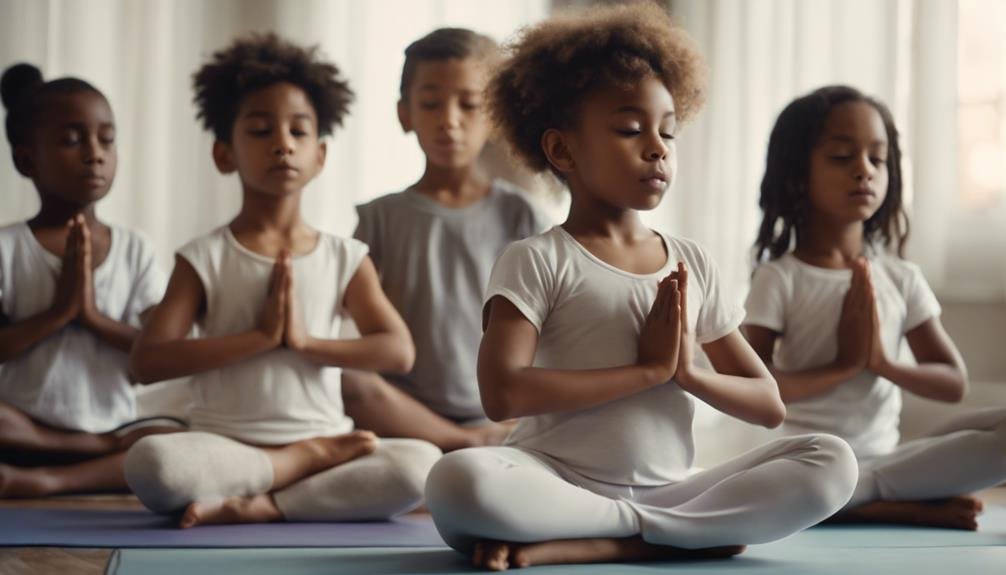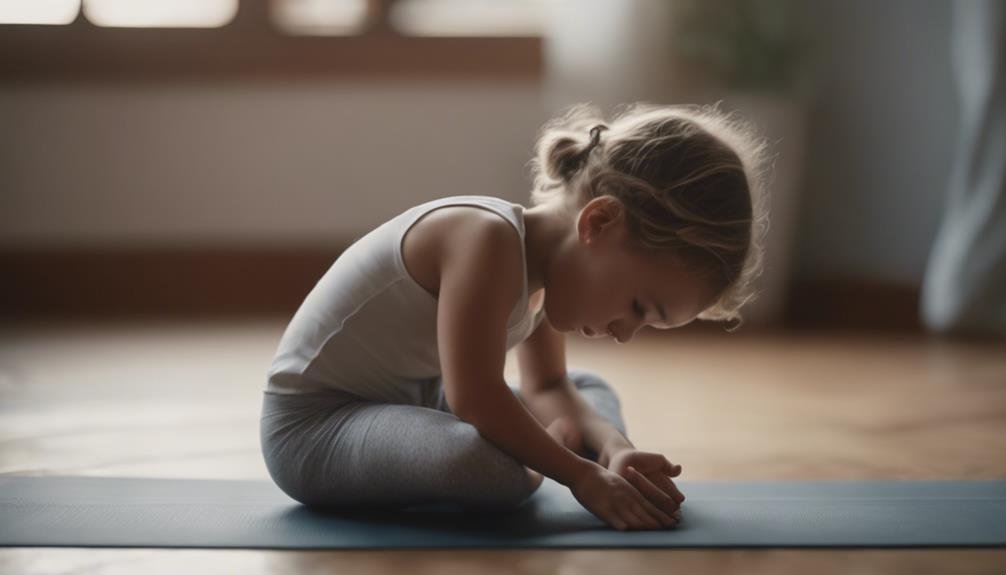"Cherishing Little Steps - A Haven for Baby and Family Journeys"
The Benefits of Yoga and Mindfulness for Young Children
Have you ever noticed how children seem to exude endless energy and curiosity? Imagine a world where they can channel that boundless enthusiasm into something that not only benefits their physical health but also nurtures their mental well-being.
The practice of yoga and mindfulness in young children has been shown to have remarkable effects on various aspects of their development, fostering skills that can last a lifetime.
Explore how these practices can lay a strong foundation for your child's future growth and resilience.
Key Takeaways
- Yoga and mindfulness enhance physical strength, balance, and coordination in young children.
- They teach emotional regulation, stress management, and promote overall well-being.
- Mindfulness improves cognitive function, attention span, and self-regulation in children.
- Yoga fosters flexibility, healthy habits, and relaxation techniques for lifelong well-being.
Physical Benefits

Engaging in yoga and mindfulness practices can lead to a range of physical benefits for young children, supporting their overall well-being and development. Through yoga, children engage in various poses that help in strength building and balance training. These poses require the activation of different muscle groups, aiding in the development of core strength and enhancing overall physical stability. Additionally, practicing yoga fosters body awareness and coordination skills in young children. As they move through different poses, they learn to connect with their bodies, improving their ability to control movements and enhancing their spatial awareness.
Research shows that regular yoga practice can significantly improve children's balance and coordination, leading to better posture and overall physical health. By engaging in poses that challenge their balance and flexibility, children develop a greater sense of control over their bodies and movements. These physical benefits not only support their current well-being but also lay a foundation for a healthy and active lifestyle as they grow.
Emotional Regulation
Developing emotional regulation skills is essential for young children's overall well-being and mental health. Teaching them how to manage their emotions effectively can lead to improved social interactions and academic performance.
Here are three key ways yoga and mindfulness can help young children with emotional regulation:
- Self-Soothing Techniques: Through practices like deep breathing and gentle movements, children can learn to calm themselves down when feeling overwhelmed or upset. These techniques help them regulate their emotions and prevent outbursts.
- Coping Mechanisms: Yoga and mindfulness provide children with healthy coping strategies to deal with stress and difficult emotions. By learning how to identify their feelings and respond to them in a constructive manner, children develop resilience and emotional intelligence.
- Mindfulness Exercises: Mindfulness activities such as body scans and guided imagery help children stay present in the moment, reducing anxiety and promoting relaxation. These exercises teach kids to acknowledge their emotions without judgment, fostering a sense of self-awareness and inner peace.
Stress Management

To effectively manage stress in young children, implementing mindfulness techniques and yoga practices can be instrumental in promoting emotional well-being and resilience. Teaching children simple breathing techniques, such as deep belly breaths or flower breathing, can help them calm their minds and bodies when feeling overwhelmed.
Encouraging relaxation exercises like progressive muscle relaxation or guided imagery can also aid in reducing stress levels. Research suggests that regular practice of these mindfulness and yoga techniques can lead to improved self-regulation and a greater sense of inner peace in children.
Improved Concentration
To bolster the attention span and focus of young children, incorporating mindfulness techniques and yoga practices can be invaluable in enhancing their ability to concentrate and engage with tasks effectively. Research suggests that cultivating a strong mind-body connection through these practices positively impacts attention span in the following ways:
- Reduced Distractions: By teaching children to focus on their breath or body sensations during yoga and mindfulness exercises, they learn to tune out external distractions more easily, leading to improved concentration during activities.
- Enhanced Cognitive Function: Engaging in activities that promote the mind-body connection helps children develop better cognitive control, allowing them to sustain attention on tasks for longer periods and switch between tasks more efficiently.
- Improved Self-Regulation: Mindfulness and yoga empower children to recognize and regulate their emotions effectively, leading to better self-control and a calmer mind, which are essential for maintaining a longer attention span.
Enhanced Flexibility

Enhancing flexibility through mindfulness techniques and yoga practices can greatly benefit young children by promoting physical health and overall well-being. By engaging in regular yoga sessions, children can experience increased mobility, allowing them to move more freely and with greater ease. Yoga poses such as the downward dog, cobra, and child's pose help stretch and strengthen muscles, enhancing flexibility over time. These practices not only contribute to physical health but also aid in relaxation techniques, teaching children how to release tension and stress from their bodies.
Studies have shown that incorporating yoga and mindfulness into a child's routine can lead to improved flexibility and joint health. This is vital during the formative years as it sets a foundation for healthy habits that can last a lifetime. Through gentle stretches and mindful movements, young children can learn to listen to their bodies, fostering a deeper connection between mind and body.
Social Skills Development
Exploring social skills development alongside enhanced flexibility, young children can cultivate valuable interpersonal abilities through engaging in mindfulness techniques and yoga practices. These practices not only benefit physical health but also contribute greatly to the social and emotional growth of children.
Here are three ways in which yoga and mindfulness can positively impact social skills development:
- Conflict Resolution: By teaching children how to regulate their emotions and respond mindfully to challenging situations, yoga and mindfulness empower them to resolve conflicts peacefully. Through techniques like deep breathing and self-awareness, children learn to approach conflicts with a calm and rational mindset.
- Peer Relationships: Practicing yoga and mindfulness in a group setting fosters a sense of community and cooperation among children. This collaborative environment encourages positive peer interactions, empathy, and understanding, which are essential for building strong and healthy relationships with others.
- Communication Skills: Yoga and mindfulness promote active listening and effective communication, helping children express themselves clearly and empathetically. These practices teach children to communicate their needs, thoughts, and feelings in a respectful manner, enhancing their interpersonal skills and overall social competence.
Better Sleep Quality

For young children, achieving better sleep quality is important for their overall well-being and development. Quality sleep supports growth, cognitive function, and emotional regulation. Implementing good sleep hygiene practices can greatly enhance the sleep quality of young children. By incorporating relaxation techniques before bedtime, such as gentle yoga poses or mindfulness exercises, you can create a calming pre-sleep routine that signals to the body and mind that it's time to unwind and rest.
To further understand the importance of better sleep quality for young children, let's take a look at some key aspects of sleep hygiene and relaxation techniques:
| Sleep Hygiene | Relaxation Techniques | Benefits |
|---|---|---|
| Consistent bedtime routine | Deep breathing exercises | Improved focus and attention |
| Comfortable sleep environment | Progressive muscle relaxation | Enhanced memory consolidation |
| Limiting screen time before bed | Visualization techniques | Better emotional regulation |
| Healthy diet and regular exercise | Mindful body scanning | Strengthened immune system |
| Avoiding caffeine close to bedtime | Guided meditation | Reduced stress and anxiety |
Overall Well-being
To support the overall well-being of young children, it's essential to ponder how their sleep quality impacts various aspects of their development. Quality sleep plays a critical role in nurturing cognitive development and fostering self-awareness in children.
- Cognitive Development: Adequate sleep is essential for the brain to process information, consolidate memories, and enhance learning. Children who get enough high-quality sleep tend to exhibit improved cognitive functions, such as problem-solving skills and attention span.
- Mind-Body Connection: Quality sleep helps strengthen the mind-body connection in young children. It allows them to tune into their emotions, thoughts, and physical sensations more effectively, leading to better self-regulation and emotional intelligence.
- Emotional Intelligence: Sleep influences mood regulation and emotional well-being. Children who experience restful sleep are often more emotionally resilient, able to handle stressors effectively, and navigate social interactions with greater ease.
Frequently Asked Questions
How Can Yoga and Mindfulness Practices Help Children With Behavioral Challenges?
When facing behavioral challenges, yoga and mindfulness can be powerful tools for managing stress and regulating emotions. By fostering a strong mind-body connection and promoting self-awareness, these practices help you navigate emotions and behaviors effectively.
Are There Any Specific Poses or Techniques That Are Particularly Beneficial for Young Children?
You might think kids won't sit still, but child-friendly poses like Tree or Butterfly can engage them. Playful breathing exercises and relaxation techniques, combined with mindfulness activities, help young ones focus, calm, and connect.
Can Yoga and Mindfulness Help Children With Learning Disabilities or Attention Issues?
Yoga and mindfulness can greatly benefit children with learning disabilities or attention issues. These practices improve cognitive development, focus, emotional regulation, and stress management. Incorporating them into daily routines can positively impact overall well-being and academic performance.
Are There Any Potential Risks or Considerations Parents Should Be Aware of When Introducing Yoga and Mindfulness to Their Children?
When introducing yoga and mindfulness to your children, it's crucial to be mindful of potential concerns. Guarantee age appropriateness, seek professional guidance, and implement safety measures. These practices can offer numerous benefits when introduced thoughtfully.
How Can Parents Incorporate Yoga and Mindfulness Practices Into Their Children's Daily Routines?
To incorporate yoga and mindfulness into your child's routine, try starting the day with morning stretches and breathing exercises. Wind down at night with relaxation techniques as part of their bedtime routine. Consistency is key.
Conclusion
Just as a tree grows strong roots to weather any storm, practicing yoga and mindfulness helps young children develop the tools they need to navigate life's challenges with grace and resilience.
By fostering physical strength, emotional regulation, and social skills, these practices serve as a foundation for growth and well-being.
Like a tree reaching towards the sky, may your child continue to flourish and thrive with the benefits of yoga and mindfulness guiding their path.


